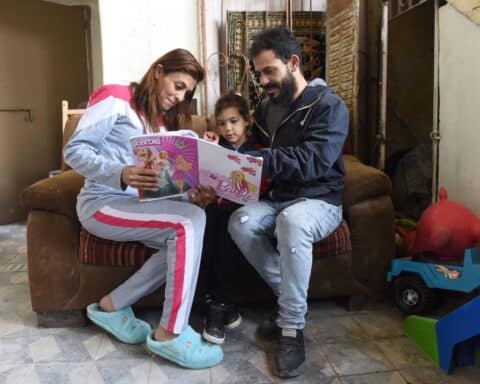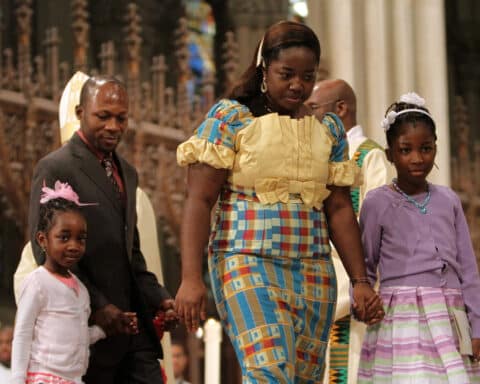Why do we laypeople think that we have to run away from our spouse, children, chores and home so that we can be with God?
The Church teaches that marriage and family life are a vocation. That means these relationships, and the chores and tasks associated with maintaining these relationships represent a major part of our own path to holiness.
When I share this with my clients who struggle with guilt over not having time for daily Mass, adoration or even an extended, meditative personal prayer time, they tend to look at me as if I am speaking a different language. I suppose I am. I am speaking the language of lay spirituality, and, to be frank, it is not a language that most Catholics speak.
Most of the things we think of as “Catholic spirituality” are drawn from the monastic and religious traditions. They just don’t fit neatly into messy marriage and family life. That’s not to say they don’t have value. There is tremendous spiritual value in making time for daily Mass, spending regular time in adoration, doing the Divine Office or having extended, meditative prayer times. But the fact is, these spiritual activities are more like spiritual treats for the average layperson. The responsibilities of marriage and family life simply do not allow most laypeople to make these practices the “meat and potatoes” of their relationship with God.
When I suggest that marriage and family life — and the tasks associated with maintaining your marriage, family life and relationships — are both holy and a path to holiness, most people will acknowledge the intellectual validity of the idea, but in their gut, they just feel like they’re being patted on the head and told that God will give them credit for the boring stuff they already have to do anyway.
We feel that working hard to make our spouse feel well-loved, taking excellent care of our children, keeping a roof over our heads and striving to make the rooms under that roof warm and welcoming are just things we do for us. But nothing could be further from the truth.
The fact is, none of these things are “yours.” The spouse you have, the children you raise, the house you live in, the job you do — all these things belong to God. He gives you these people and roles, and, as his good servant, he asks you to attend to these tasks seriously and care for these people well.
Constantly running away from your spouse, children, house or job to “be with God” does not make you a good Christian. It makes you the servant who is constantly shirking the responsibilities so that he or she could do things that he or she thinks is more valuable.
Making your spouse and children feel deeply loved and cared for is hard work. Making your house a warm, loving, hospitable home — especially on a budget — is hard work. Doing these things stretch you. They force you to grow in ways you never thought you would have to grow. They challenge you to confront sins you never dreamed you struggled with and develop virtues you never knew you needed. It means exceeding at loving the people God has given you and doing the tasks he has placed in your charge.
But more than this, when we make these activities the centerpiece of our spiritual life, we consecrate our homes to Christ. By doing this, we enable the mundane activities of family life to both communicate God’s love to our spouse and children and serve as a true path to holiness.
As far as I am concerned, Pope St. John Paul II should be the patron saint of the lay vocation. He did more to define the so-called “universal call to holiness” than anyone before him. He canonized more lay saints than ever before. He promoted the Theology of the Body to enable us to see the Gospels, the sacraments and the Church itself through the lens of Christ the Bridegroom instead of just Christ the High Priest. He made St. Thérèse of Lisieux a Doctor of the Church because of her “little way of holiness,” which is characterized by doing small things with great love and represents the path of holiness that is most consistent with the lay vocation.
For the layperson, drawing closer to God doesn’t mean leaving your spouse, kids and home to go find him. It means asking God to help you wash the dishes, pay your bills, love your spouse and care for your kids in a way that glorifies him, communicates his love to the people you are serving and makes you the saint you are meant to be. God doesn’t want you to leave home to find him. He is standing at your front door, waiting for you to invite him in.
Dr. Greg Popcak is the author of many books, including “Praying For (And With) Your Spouse: The Way To Deeper Love” (Word Among Us, $15.95).





